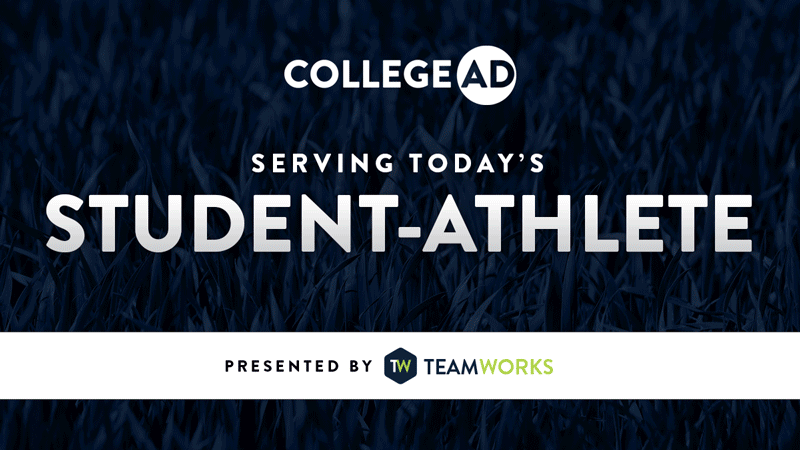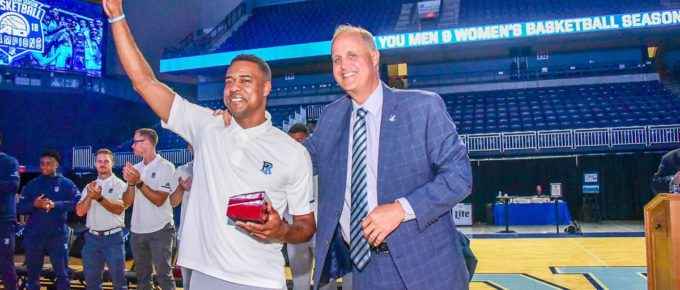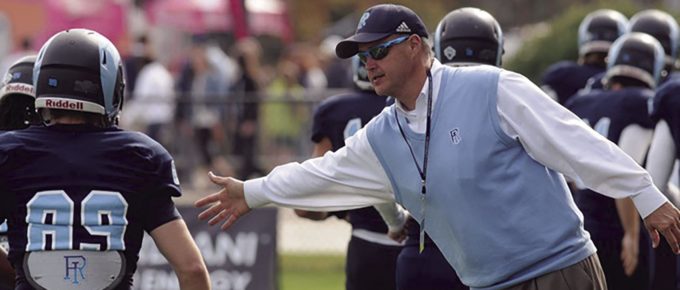 “One of the hardest parts about it is that they are not here. On our campus, we only have a handful of student-athletes and even with those, we get so little face-to-face interaction. I know our coaches have been doing a great job communicating and having Zoom meetings, etc. I’ve been in on a few of those video meetings, I know I sound corny, but it’s been great to see them. I get to hear their concerns and hear their questions, but so much of what’s going on right now, we just don’t have answers.” -Rhode Island AD Thorr Bjorn
“One of the hardest parts about it is that they are not here. On our campus, we only have a handful of student-athletes and even with those, we get so little face-to-face interaction. I know our coaches have been doing a great job communicating and having Zoom meetings, etc. I’ve been in on a few of those video meetings, I know I sound corny, but it’s been great to see them. I get to hear their concerns and hear their questions, but so much of what’s going on right now, we just don’t have answers.” -Rhode Island AD Thorr Bjorn
 Ever since arriving on campus at the University of Rhode Island in July 2007, Director of Athletics Thorr Bjorn has worked tirelessly on the student-athlete experience. That mission has seen major adjustments over the past few months, including new forms of communication. Bjorn says the Zoom calls that he’s been a part of have been casual, and he encourages his student-athletes to ask any questions on their mind.
Ever since arriving on campus at the University of Rhode Island in July 2007, Director of Athletics Thorr Bjorn has worked tirelessly on the student-athlete experience. That mission has seen major adjustments over the past few months, including new forms of communication. Bjorn says the Zoom calls that he’s been a part of have been casual, and he encourages his student-athletes to ask any questions on their mind.
“I tell them, there’s no question that’s off-limits, so they ask, ‘are we dealing with budget cuts, how is this going to impact my program, is the travel going to be restricted?’ Those are the types of questions that they are asking. It’s good to give them transparency.”
The pandemic isn’t the only thing on the Rhode Island student-athletes’ minds. They are very aware that they are living through a cultural movement and led a student-driven campaign in support of Black Lives Matter.
“Listening to them and members of my staff, my eyes have been opened in a way if I’m honest, that they haven’t been opened before. Knowing that we have to deliver a message of support for students and the Black Live Matter Movement, I just didn’t want it to be another public relations rallying cry, we really spent time talking internally. Figuring out what that statement from the department should be and really thinking of it more as an action plan than a statement. We need to change the culture. We may not be able to change the culture of the world, but we can change the culture of our front yard.”
Bjorn’s team is striving to learn and grow as they come up with ways to push diversity and inclusiveness within the department. He says he learned a lot through open discussions with colleagues and asking questions.
 “I asked our head of diversity — how can I be a better ally? She said to get out of my comfort zone. I’m excited about this work we are doing, it’s interesting and challenging times, we’ve got a lot of work to do and an opportunity to do it.”
“I asked our head of diversity — how can I be a better ally? She said to get out of my comfort zone. I’m excited about this work we are doing, it’s interesting and challenging times, we’ve got a lot of work to do and an opportunity to do it.”
Bjorn knows his department has to take meaningful steps to rise to the challenge of this movement quickly, because student-athletes everywhere are watching.
“They are going to want to know what we are doing; they don’t want us to just say a couple things and then go away.”
Messaging and communication have become integral moving parts at Rhode Island, with the Black Lives Matter movement as well as the pandemic. Thorr Bjorn says transparency is key for leadership during tough times.
“We strive for as much transparency as possible, making sure our coaches are scheduling those Zoom calls, we are following up with department meetings. Just understanding that it’s OK to say ‘right now I don’t know the answer.’”
He says people need to see the athletic department acting, trying to work on their behalf and not just make decisions on an island. The Ram Supporting Rams initiative was born out of trying to stay transparent and connected to the student-athletes and the greater community.
“Within my family, we decided to support local restaurants who were really having a tough time. We pick up food every Friday night and spread the word on social media. We have to help out our partners who’ve always stood behind us.”
Bjorn explains he’s been home with his wife and three college-aged daughters. He says having twin 22-year-olds and a 20-year-old in the house during this time has really helped him better understand what his student-athletes are going through. “My youngest is a sophomore so I could ask how the online classes are going, what’s that experience like? I know they are scientific examples, but I can share what my daughter’s experience has been like. They want to give me that feedback and in turn it helps with my understanding.”
“My youngest is a sophomore so I could ask how the online classes are going, what’s that experience like? I know they are scientific examples, but I can share what my daughter’s experience has been like. They want to give me that feedback and in turn it helps with my understanding.”
Bjorn says that understanding the challenges of the pandemic as a whole have helped him reevaluate his department’s priorities.
“We know there will be impacts, even if we don’t know exactly what that will be. We can try to prepare for budgetary impacts. What are some of the investments and initiatives we were thinking about? How do we readjust to know what we can do effectively and not just do something to do it? What can we do with our strategic plan to try and impact the health and wellness of our student-athletes? That’s the most important thing we should be doing right now, ensuring that they have a pathway to graduation.”
Thorr Bjorn says that the big plans they have won’t change, but he wants to make sure the focus is on the student-athletes’ well-being and their plans for the future.
“They need to be successful with what the upcoming academic experience will look like, and while we may not know exactly what that is, what we do know is our core mission. That mission is providing the best possible experience we can and a pathway to graduation. Where do those investments need to go so at the end of the day we stay on mission?
